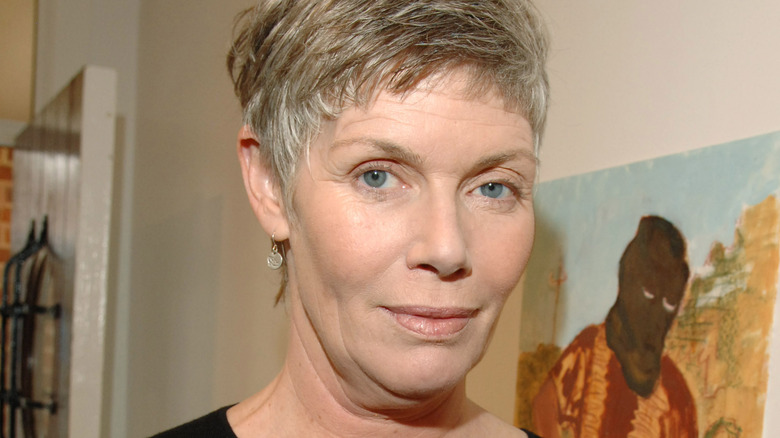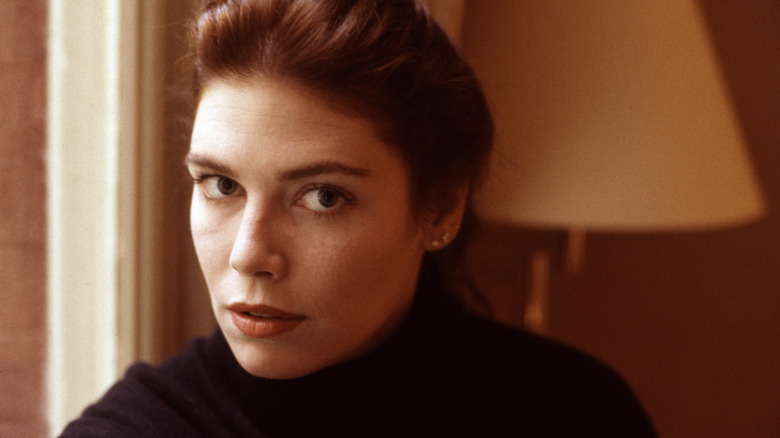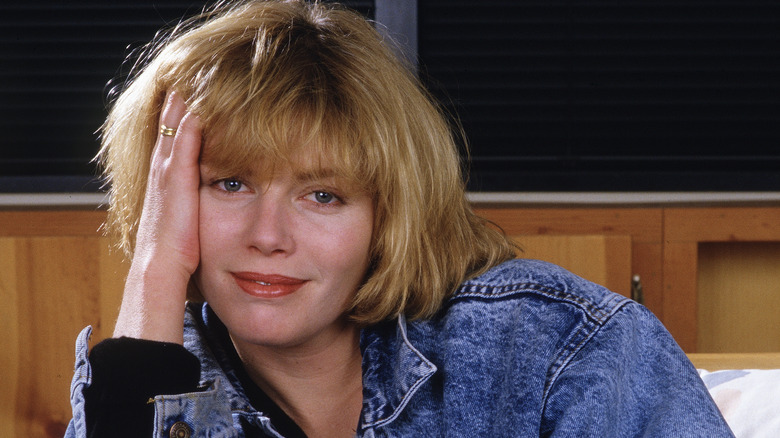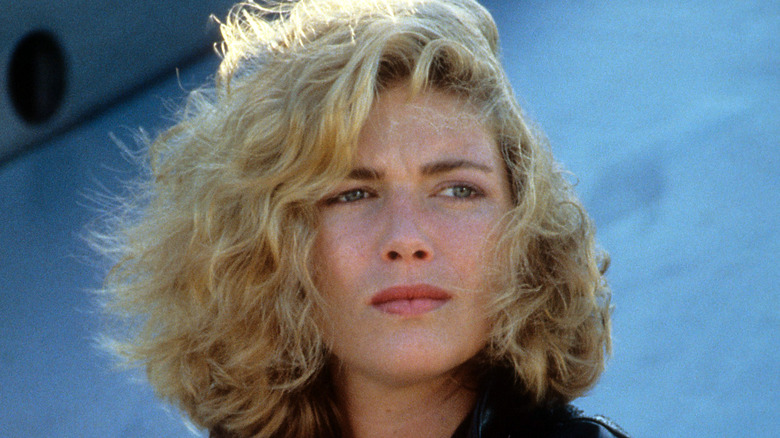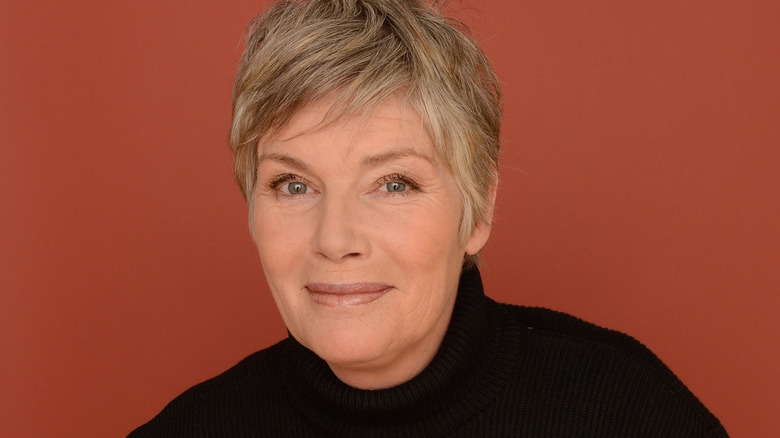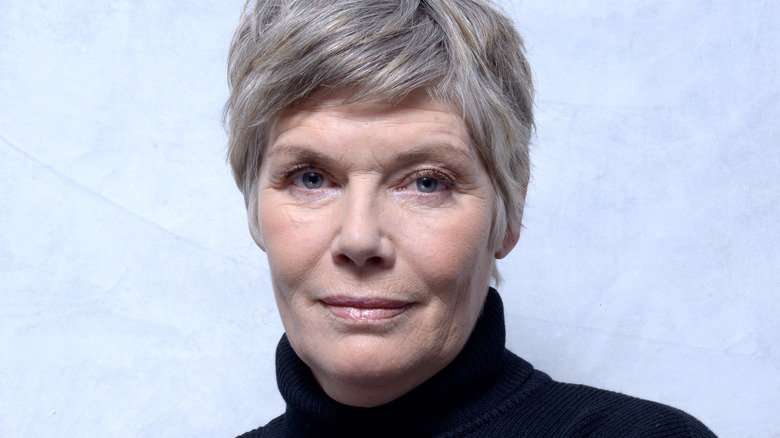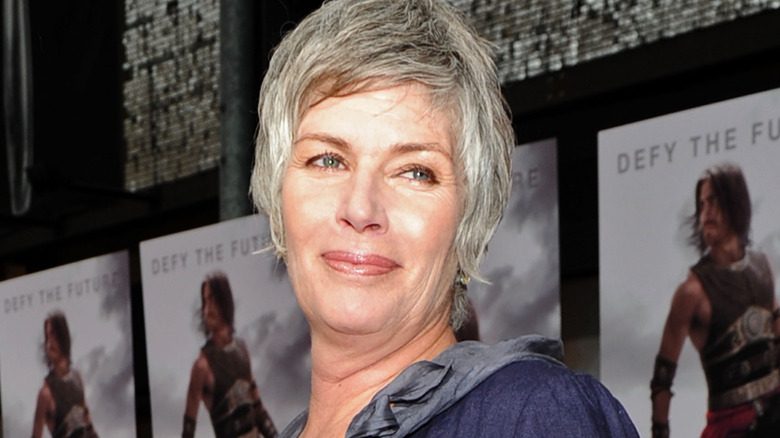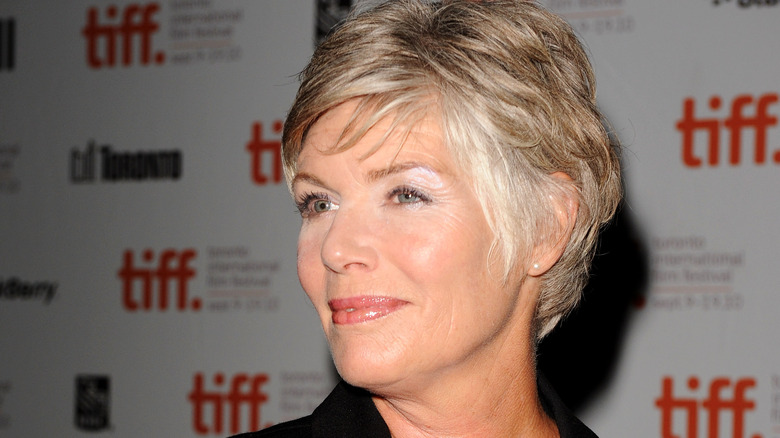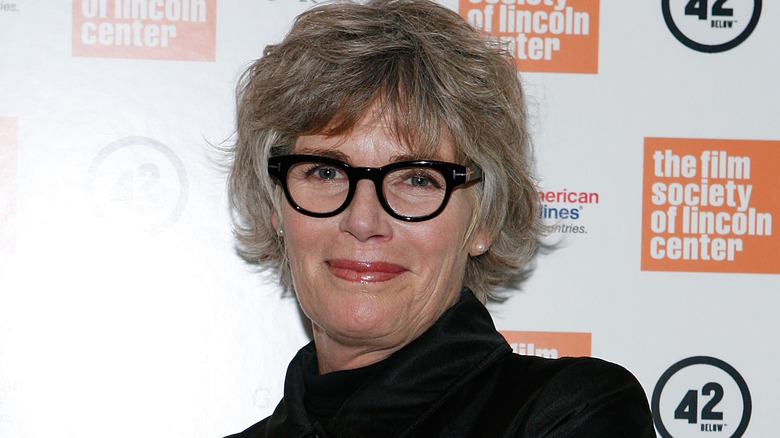Tragic Details About Top Gun Star Kelly McGillis' Life
The following article contains references to sexual assault and suicidal ideation.
Kelly McGillis may be a name we rarely hear these days, but her legacy is indisputable. The "Top Gun" actor remains one of the most enduring embodiments of '80s chic; the image of her as windswept Charlie is as iconic as that of Maverick and Goose high-fiving over their need for speed. But as with so many once-loved Hollywood stars, McGillis has all but disappeared from the mainstream.
Though it's been a hot minute since she's graced our screens, the actor seems to feel just fine about taking a break from an industry that caused her immense trauma. If just one word could describe McGillis, it would be "survivor." Despite the myriad challenges she's faced over the past four decades, she is rising above notions that she ought to present herself as an idealized and aspirational film star. "I honesty don't care what people think of me," she told HuffPost. "I used to live my life exceedingly worried what people thought of me. Today, it's not important, and I'm good with that. You know, I think anybody's life is full of up and down and challenges. They are all opportunities to grow and chance[s] to grow."
Subsequently, McGillis has opted for a quieter life these days. But most of all, she's intent on using her fame and past personal turmoil to help those who have also survived horrific misfortune. Here are the tragic details of "Top Gun" star Kelly McGillis' life.
Kelly McGillis was sexually assaulted
In 1982, Kelly McGillis was the victim of a harrowing home invasion, the likes of which would leave an imprint on her for the rest of her life. Having moved to New York at the age of 21, McGillis, who was raised in Southern California, wasn't used to violent confrontations. She first experienced violence when she was robbed at gunpoint in 1981.
A year later, two men broke into her home and raped her at knifepoint. Discussing the ordeal with People in 1988, McGillis said that she had resigned herself to getting murdered that night. In an interview with Philadelphia Gay News, she revealed that her girlfriend who was present with her at the time was also assaulted. The harrowing experience led to their relationship disintegrating. The women's lives were saved when police banged on the door and the attackers fled.
At the police station, she was able to identify her attackers. "I wanted those guys caught," she told People. "I hated them. I wanted to hurt them as much as they hurt me." Though one of the assailants served three years in prison, he was sentenced to 50 in 2006 after investigators discovered he was a serial rapist who had committed many further crimes. There was insufficient DNA evidence to convict the second attacker. Following the assault, McGillis became an advocate for rape survivors. "The thing I feel most passionate about is that victims talk and seek help," she said.
If you or anyone you know has been a victim of sexual assault, help is available. Visit the Rape, Abuse & Incest National Network website or contact RAINN's National Helpline at 1-800-656-HOPE (4673).
She has suffered from mental illness and body image issues
Following her sexual assault ordeal, Kelly McGillis suffered from depression, anxiety, post-traumatic stress disorder (PTSD), and thoughts of suicide. "If it had not been for the understanding of my friends and teachers at Juilliard, I probably would have killed myself," she told People. However, she opted not to seek therapy because she believed no one could possibly understand how she felt. She ultimately underwent therapy in 1984, realizing that without intervention, she was running a risk of acting on her darker impulses.
As she told People, the assault led to her gaining a lot of weight and hiding away from the world. Speaking with The Guardian, she admitted that she thought she would never be able to forge a career as an actor because she saw herself as "a tall, fat, geeky, ugly girl that nobody liked."
But as she became increasingly famous, these self-esteem and body issues worsened. As she told It Came From ... in 2021, she'd recently rewatched one of her films at a fundraising event. She admitted that in seeing her younger self, she couldn't understand how she'd once thought she was too ugly to appear onscreen and finally realized that she had been worthy. "I really had issues," she conceded. "It was very interesting to me, because I remember making the film, I felt like I was fat and ugly, and I thought, 'I wonder why I thought that so much back then?'"
If you or someone you know is struggling or in crisis, help is available. Call or text 988 or chat 988lifeline.org.
Kelly McGillis struggled with her sexuality
Growing up, Kelly McGillis was never close with her parents, who kicked her out of the house at 17. The stuffy atmosphere in which she was raised made coming to terms with being gay difficult. "I was very attracted to girls in high school," she told Philadelphia Gay News, "and that horrified me because I just knew that wasn't right. That's what I told myself." The fact that her family never talked about sex exacerbated such ideation, leading her to experience heightened anxiety and confusion.
Tragically, the aforementioned traumatic assault she endured in 1982 led to McGillis erroneously believing that it was a punishment for being gay. "When you're the victim of a violent crime like that, I think it's normal to think, 'What did I do to deserve this?'" she told Philadelphia Gay News. "And the story that I came up with that I could cope with was that I was being punished because I liked girls, because I'm gay."
Speaking to The Independent in 2014, she said she also felt discouraged from coming out while she was raising her children because the family was living in a conservative town in Pennsylvania. But in 2009, McGillis chose to live her truth and came out publicly as gay. In 2010, she married her partner, Melanie Leis. Though they have since split, Leis told INTIX that McGillis remains the love of her life.
The actor survived substance misuse
Along with the suicidal ideation that came with her deep-rooted trauma, Kelly McGillis suffered from substance misuse. In her aforementioned chat with People, she likened her alcohol misuse to a demon that crept up on her in her darkest moments. "Because I was so afraid to go to sleep at night," she explained, "I would drink, and it got progressively worse. ... The deceptive thing about alcohol is that you think it allows you to forget — and then you wake up in the morning."
This continued for years and worsened in 2000 when McGillis met her girlfriend Melanie Leis, who also struggled with substance misuse. "We were partners in crime and were both drinking and abusing drugs," Leis told The New York Times. But the following year, McGillis sought help and got sober after relocating to a halfway house in the Pennsylvania countryside. Later, she split up with Leis, though they reunited after she also sought help for her illness.
These days, McGillis draws on her past experiences to help others who are struggling with substance misuse. Subsequently, she began working 40 hours a week at a rehab facility in South Jersey. "I work primarily with the women's population, and I really love it," she told The Oklahoman. "I find it's just an amazing gift to see people come in hopeless and to be given some hope and some desire to live and some tools for hopefully changing their lives, their children's lives."
If you or anyone you know needs help with addiction issues, help is available. Visit the Substance Abuse and Mental Health Services Administration website or contact SAMHSA's National Helpline at 1-800-662-HELP (4357).
Following her divorce, she lost custody of her children
Kelly McGillis was married to men twice before coming out. Her first marriage, to Boyd Black, ended acrimoniously. Tragically, when McGillis later told Black that she'd been raped, he said he was glad, to which she responded by throwing a glass at him.
In 1989, she married businessman Fred Tillman, with whom she had two daughters. Speaking to Philadelphia Gay News, she acknowledged that she thought Tillman would be her savior from her personal turmoil. "I met Fred, and I thought, 'Fred will protect me,'" she reflected. "Nobody will ever hurt me again. ... You can only live a lie for so long without absolutely destroying yourself." The relationship was rocky from the start. Following the birth of the couple's second child, Tillman was arrested for propositioning a sex worker who turned out to be an undercover cop.
As McGillis' substance misuse worsened and her health declined, she lost custody of her daughters. However, she fought for her own recovery to get her daughters back, and significantly, that meant turning down acting roles. "I had an agent who kept calling," she told Philadelphia Gay News, "and we finally got in an argument, and I had to tell him, 'You don't seem to understand. I have to do this for my children and for myself. I have to be the best parent I know how to be.' And that's what I did." She regained custody of her children in 2001.
Kelly McGillis was the victim of a second home invasion
Over 30 years after Kelly McGillis' first assault by home invaders, she was once again targeted by an intruder. In 2016, she arrived home to find that a woman, Laurence Marie Dorn, and her young daughter had broken into the house. Dorn, whom McGillis had never met, began screaming at her and accused the actor of stalking her on Twitter, which she denied. "I ran out the front door and called 911," she wrote on Facebook. "She ran out after me and began punching and scratching me trying to grab the phone out of my hand." Dorn was arrested and held in Henderson County Jail.
Discussing the incident with WLOS, McGillis expressed sympathy for Dorn's daughter. "I have a great faith that something good comes out of everything. ... In this particular instance, maybe I was an instrument to get that child away from that mother," she said. "Maybe this is what had to happen ... so that child could be safe."
Appearing in court in 2017, McGillis testified that the incident filled her with terror. Her claims that she had never interacted with Dorn online were called into question when defense lawyers presented her with screenshots apparently showing a Facebook Messenger conversation between the two women. Dorn was found guilty of breaking and entering, though the jury believed there was insufficient evidence to find her guilty of deliberately intending to harm McGillis. She was sentenced to 18 months probation.
Kelly McGillis blames ageism on her career decline
Kelly McGillis' disillusionment with Tinseltown began early in her career with her exposure to the industry's uglier side. In 1984, she was suddenly dropped from the movie "Bachelor Party" when producers determined she was insufficiently attractive. "After one day of shooting, the producers came to me and said something to the effect that I was not right for the movie, I was not pretty enough," she told Daily Record.
As is often the case with women over 50 in Hollywood, such prejudices worsened as McGillis got older. "[I]n my 50s, the amount of interesting roles has diminished immensely," she told the Advocate. Perhaps the most pointed example of this apparent ageism was the "Top Gun: Maverick" filmmakers' decision not to cast both McGillis and Meg Ryan for the hotly anticipated 2022 sequel. Director Joseph Kosinski told Insider that the two women weren't recast because he wanted to move with the times (McGillis told The Independent in 2014 that she was game for appearing in the film).
When Entertainment Tonight asked McGillis whether she had been approached to star in the flick, she replied staunchly in the negative. "Oh my god, no. ... I mean, I'm old and I'm fat and I look age appropriate for what my age is," she said. "And that is not what that whole scene is about. ... But ... I'd much rather feel absolutely secure in my skin and who and what I am at my age."
She lives with a chronic illness
Circa 2014, Kelly McGillis was diagnosed with alpha one antitrypsin disorder. According to a 2007 study, the genetic disorder increases the risk of developing conditions such as chronic obstructive pulmonary disease and liver cirrhosis. In an interview with Entertainment Tonight, McGillis acknowledged that her priorities in life had shifted along with her diagnosis. Subsequently, the star conceded that she was grateful she didn't have acting work to deal with along with the illness. "I feel really blessed that I don't have to work, you know?" she said. "But I get the option to work, so I'm really blessed in that way. Not many people get that option later in life, so I feel very lucky."
The diagnosis was yet another obstacle in McGillis' tragic life story. In 2014, she told HuffPost that the seemingly immeasurable struggles she has endured throughout her life would lead others to think that her story is unbelievable. "People get little fragments of your life, especially if you are an actor," she said. "It's made up of things, opinions, work — so many different things. My life has been crazy and out of control and just blessed, and nobody would believe it if they knew the whole story."
But by talking about her health issues, both physical and mental, McGillis is helping to raise awareness of them. She may no longer be defined by her role as Charlie, but no one can deny she's a survivor.
